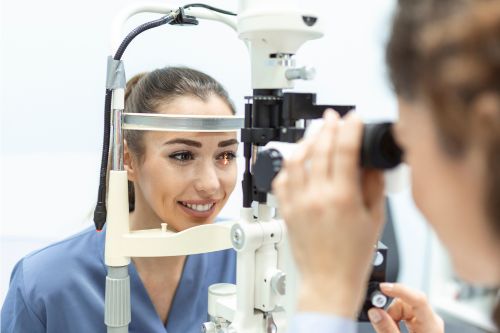Table of Contents
Optometry course | Introduction
Optometry is a field of healthcare that deals with the diagnosis, treatment, and management of vision-related problems. It is a vital area of healthcare that has become increasingly important in recent years due to the growing prevalence of eye diseases and conditions. If you’re interested in pursuing a career in optometry or simply want to learn more about this field, taking an optometry course is an excellent option. In this article, we’ll explore the various aspects of an optometry course, including what you can expect to learn, the curriculum, the requirements, and more.
What is optometry?
Optometrists are trained professionals who specialize in the correction of refractive errors, such as nearsightedness, farsightedness, and astigmatism, and the detection and management of eye diseases and conditions, such as glaucoma, cataracts, and macular degeneration.
The history of optometry dates back to the 19th century, with the first optometry school being established in the United States in 1904. Since then, optometry has become a highly specialized field of healthcare, with a scope of practice that includes the prescription of glasses and contact lenses, the diagnosis and management of eye diseases and conditions, and the co-management of patients with other healthcare professionals.
Why study optometry?

If you’re considering a career in healthcare, optometry is an excellent option for several reasons. Firstly, optometry is a highly in-demand field, with a projected growth rate of 10% between 2018 and 2028, according to the US Bureau of Labor Statistics. This growth is attributed to the aging population, which is at a higher risk of developing eye diseases and conditions.
Secondly, optometry is a well-paying profession, with a median annual salary of $120,000 in the United States. The salary prospects are even higher for those who specialize in areas such as pediatric optometry, low vision rehabilitation, and sports vision.
Lastly, optometry is a highly rewarding field that allows you to make a significant impact on people’s lives. By helping patients improve their vision and manage their eye health, optometrists play a crucial role in enhancing their quality of life.
What do you learn in an optometry course?
An optometry course is designed to provide students with a comprehensive understanding of the human visual system, vision correction techniques, and the diagnosis and management of eye diseases and conditions. Here are some of the topics you can expect to cover in an optometry course:
A. Vision correction techniques
This includes the prescription of glasses and contact lenses, as well as the fitting of specialty lenses such as orthokeratology lenses, which are used to correct refractive errors while the patient sleeps.
B. Eye diseases and conditions
This includes the detection and management of conditions such as glaucoma, cataracts, macular degeneration, diabetic retinopathy, and dry eye syndrome.
C. Contact lens fitting
This involves the selection and fitting of contact lenses for patients with various needs, such as those with astigmatism, presbyopia, and corneal irregularities.
D. Diagnostic procedures
This includes various tests and procedures, such as visual acuity tests, refraction tests, slit-lamp examinations, and dilated eye exams, which are used to detect and diagnose eye diseases and conditions.
Optometry course curriculum
The curriculum of an optometry course typically includes three main components:
A. Basic Sciences: This component covers the fundamental sciences that underpin optometry, such as anatomy, physiology, and biochemistry.
B. Optometric Techniques: This component covers the practical aspects of optometry, such as vision correction techniques, contact lens fitting, and diagnostic procedures.
C. Clinical Rotations: This component provides students with hands-on clinical experience, working with patients under the supervision of licensed optometrists. Clinical rotations are a critical component of optometry education, as they provide students with the opportunity to apply their knowledge in real-world settings and gain practical experience in patient care.
Optometry course requirements

To pursue a career in optometry, you’ll need to complete a Doctor of Optometry (OD) degree from an accredited optometry school. The requirements for admission to an optometry program vary by school but typically include the following:
A. Prerequisites: Most optometry schools require applicants to have completed a minimum number of credit hours in courses such as biology, chemistry, physics, and calculus.
B. Accreditation: It’s essential to ensure that the optometry program you choose is accredited by the Accreditation Council on Optometric Education (ACOE). Accreditation ensures that the program meets the standards for optometric education set by the ACOE and prepares you for licensure.
How to prepare for an optometry course?
Preparing for an optometry course involves gaining relevant experience and preparing for entrance exams. Here are some steps you can take to prepare for an optometry course:
A. Shadowing an optometrist: Shadowing an optometrist allows you to gain first-hand experience in the field and understand what the profession entails.
B. Gaining relevant experience: Gaining experience in healthcare, such as working as a medical assistant or volunteering at a clinic, can help you gain valuable skills and knowledge that will be useful in an optometry program.
C. Preparing for entrance exams: Most optometry programs require applicants to take the Optometry Admission Test (OAT). Preparing for the OAT involves reviewing the material covered on the exam and taking practice exams to familiarize yourself with the format and timing.
Top optometry schools
Choosing the right optometry school is essential to your success as an optometrist. Here are some of the top optometry schools in the United States, according to US News & World Report:
A. University of California-Berkeley School of Optometry
B. University of Houston College of Optometry
C. University of Alabama at Birmingham School of Optometry
D. The Ohio State University College of Optometry
E. Indiana University School of Optometry
Future of optometry
A. Advancements in technology: Technological advancements, such as telemedicine and artificial intelligence, are revolutionizing the way optometrists diagnose and manage eye diseases and conditions.
B. Changing healthcare landscape: As healthcare moves towards a more integrated model, optometrists are playing an increasingly important role in the co-management of patients with other healthcare professionals.
C. Role of optometrists in the future: Optometrists are well-positioned to play a critical role in the future of healthcare, with their expertise in eye care and vision-related problems making them essential members of healthcare teams.
Key takeaways
- Optometry is a fascinating field that offers excellent job prospects, a high salary, and the opportunity to make a significant impact on people’s lives.
- Pursuing an optometry course is an excellent option for those interested in a career in healthcare, with comprehensive coursework and clinical rotations providing students with the skills and knowledge necessary to become successful optometrists.
- By staying abreast of advancements in technology and changes in the healthcare landscape, optometrists can continue to provide high-quality care to patients and stay at the forefront of their profession.
Did you find this blog helpful? Do share your perspectives about the blog in the comments below. Please get in touch with us by clicking here for your study abroad application process or shortlisting universities. We would be happy to assist you with your queries.
Liked his blog? Read next: A quick insight into Herzing University
FAQs
Q1. What is an optometry course, and what does it entail?
Answer: An optometry course is an educational program designed to train individuals in the field of optometry, which focuses on eye care and visual health. The course typically covers subjects such as ocular anatomy, physiology, optics, pharmacology, and various eye diseases and conditions. Students learn how to diagnose and treat visual impairments, prescribe corrective lenses, and manage eye health. Practical training, including clinical rotations, is often included to provide hands-on experience in examining patients and addressing their eye care needs.
Q2: What are the prerequisites for enrolling in an optometry course?
Answer: Prerequisites for an optometry course can vary depending on the institution and country. However, common requirements include a bachelor’s degree in a related field, such as biology or chemistry, with a strong emphasis on science courses. Some programs may also require specific prerequisite courses, such as anatomy, physiology, physics, and calculus. Additionally, applicants often need to take the Optometry Admission Test (OAT) or an equivalent exam to demonstrate their academic aptitude and knowledge in relevant subjects.
Q3. What career opportunities are available after completing an optometry course?
Answer: Graduates of an optometry course have various career opportunities in the field of eye care. The most common path is to become a licensed optometrist, working in private practices, eye clinics, or hospitals. Optometrists provide comprehensive eye exams, prescribe glasses or contact lenses, diagnose and manage eye diseases, and co-manage patients with ophthalmologists. Other career options include working in research and development, public health, academia, or as consultants for eyewear companies. Some optometrists also choose to specialize in areas such as pediatric optometry, geriatric optometry, or low vision rehabilitation, expanding their expertise in specific patient populations.







